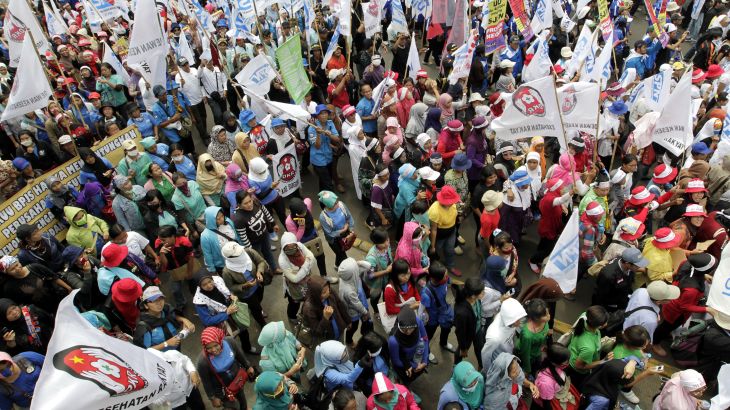Tens of thousands protest in Indonesia
Workers demand a higher minimum wage and an end to outsourcing as unrest in Southeast Asia’s largest economy amplifies.

Tens of thousands of workers have gathered outside the presidential palace in Jakarta in Indonesia, demanding higher wages, better working conditions and that more economic growth trickle down to the working class.
The demonstrations on Thursday come a day after a governor in the capital Jakarta agreed to raise the minimum wage by 44 per cent but protesters said they wanted government to provide better health care and pensions and wanted to ensure that the courts do not over turn their decision.
Keep reading
list of 4 itemsWhy is Germany maintaining economic ties with China?
Behind India’s Manipur conflict: A tale of drugs, armed groups and politics
China’s economy beats expectations, growing 5.3 percent in first quarter
Al Jazeera’s Step Vaessen, reporting from the capital, said “tens of thousands of workers have been marching through the city centre and have reached the presidential palace … they have been demonstrating for weeks for a higher minimum wage, and they have been demanding to get rid of a much hated outsourcing policy.
“Basically, government has met these demands over the past week, now they are here to show they are not satisfied yet.”
They say that they have an expensive pension fund and an expensive health scheme, and they want to get rid of them as well, Vaessen said.
Governor Joko Widodo agreed to lift the minimum monthly wage in Jakarta to 2.2 million rupiah ($228) from 1.53 million rupiah. In Indonesia, local authorities set minimum wages for their regions.
Wealth gap
|
“Workers are demanding better rights because the gap between the well off and not so well off have increased in Indonesia“ – Subramananiam Pillay, Journalist |
“Workers are demanding better rights because the gap between the well off and not so well off have increased in Indonesia,” Subramananiam Pillay, a journalist based in Jakarta, told Al Jazeera.
“This is why they are protesting.” he said.
Pillay said that unions are likely to influence political parties to forward their case, especially if parties want to win the next legislative and presidential elections.
On Wednesday, thousands blocked the streets of the capital, and marched to the presidential palace, demanding a rise in the minimum wage and a ban on contract work, in a wave of protest to hit the country.
On November 15, workers took to the streets in Purwakarta, West Java, and the rising unrest is said to indicated growing worker and union distrust of the government and an increasing boldness to demonstrate for change.
In early October, a nationwide strike crippled production at 1000 factories.
The number of protests have increased even as Indonesia posted strong growth and attracted a record $5.9 bn in foreign direct investment in the third quarter of this year.
Indonesia’s economy has expanded more than five per cent in seven out of the past eight years.
The country is expected to grow by more than six per cent in 2012 as it continues to attract record amounts of foreign direct investment as more global companies try to reach the growing middle class as well as its rich natural resources.
On Thursday, the Jakarta Post reported that foreign direct investment (FDI) is likely to remain high in 2013 “as the country will likely retain its economic strength amid economic problems beleaguering other competitors in attracting foreign investment to the region.”